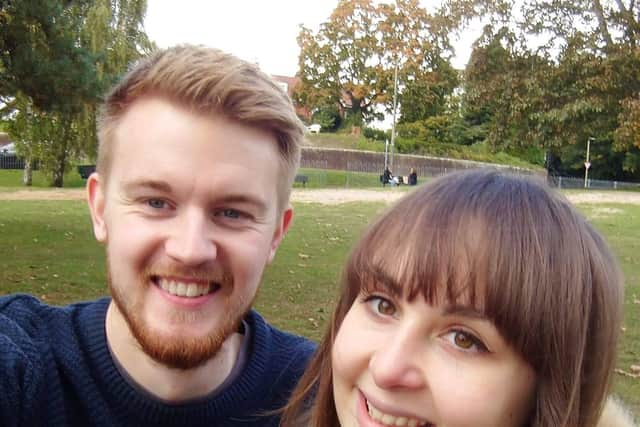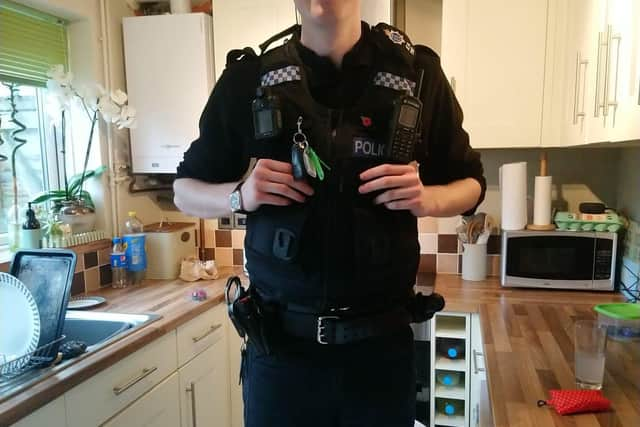“I just put my head in my hands and burst into tears”- Bognor Policeman suffers two strokes at only 25
and live on Freeview channel 276
This time last year, 25-year-old police officer Kieren Rogers was ‘as fit as a fiddle’. Today, after two life-changing strokes, he feels lucky to be able to walk.
“For the first few months, I was quite inactive because the right side of my body was very weak. Even walking was quite troublesome: I was dragging my leg, I couldn’t really lift it up, the whole right side of my body was really heavy.” He said
Advertisement
Hide AdAdvertisement
Hide Ad“But now I’m a lot more active. In the last month I’ve made a lot of progress. I can get out, and my walking is pretty much back to perfect, but I’m not quite there yet. My recovery so far has been really good. It’s had a lot of downs, but it’s mostly ups at the moment, which is really nice.”


Mr Rogers suffered his first stroke in August last year after waking up from a nap before work and being violently sick.
“You know when you’re very drunk and the room’s spinning? That’s how I felt.”
CT scans at the hospital- where he stayed for a week- revealed he had suffered from a minor stroke and had to take some time off work.
Advertisement
Hide AdAdvertisement
Hide AdEven so, Mr Rogers’ recovery seemed to be going well. By November, he’d returned to work and was regularly running. By December, he’d resumed his full duties. Tjings seemed to be going well, but it was unfortunately short lived. On January 7, Mr Rogers had another stroke while at home with his girlfriend.


“I was just sitting on the sofa, we were watching TV while I played games on the laptop, when, all of a sudden, my hand felt really heavy and I couldn’t quite move the mouse. I tried to say something to my partner, but it was just gibberish.” He said.
“I remember when my girlfriend was on the phone to the ambulance, I just put my head in my hands and burst into tears because I knew what was happening and didn’t want to be there again.”
This time, Mr Rogers suffered from an Ischemic stroke, resulting in weakness on the right of his body and slurred speech. He’s due to return to work fairly soon but, when he does, he won’t be in the field.
Advertisement
Hide AdAdvertisement
Hide AdIt’s heart-breaking for the Bognor bobby, who said he loved working with the community. Still in recovery, he made clear the last few months have been extraordinarily difficult: “With Covid and everything as well, it’s been quite a lonely experience. Just because family members and people haven’t been able to come and see me,” he said.
“My emotions were all over the place for a few weeks. I was becoming very angry at small things, I couldn’t cry when I wanted to and instead I’d laugh. I’ve always been a very positive person, but there have been moments throughout the last few months where I’ve wondered ‘what’s the point?’”
“I’m quite lucky though because I’ve got my girlfriend here with me. She’s been amazing, an absolute rock for me and I wouldn’t be as far along as I am without her. A lot of the reason I’ve been trying to make people aware of strokes in young people is because there might be a person out there who’s struggled with something similar and hasn’t got anybody, who’s going through this on their own.”
Mr Rogers suffers from a condition called Antiphospholipid Syndrome, which means his blood is more likely to clot, increasing his risk of a stroke. “It’s nothing to do with lifestyle, it’s not hereditary or anything. It’s just natural selection,” he jokes, “some people have it, some people don’t.” That, despite his relative youth and exemplary fitness, he will always be at risk.
Advertisement
Hide AdAdvertisement
Hide AdAnd he’s not alone. Victoria Meynell, associate director of the Stroke Association in the South East said one in four strokes happen to people of working age.
“Stroke devastates lives in an instant, often leaving people facing a lifetime of disability. A stroke is a medical emergency, so recognising the signs and calling 999 for an ambulance is crucial. The quicker a person arrives at a specialist stroke unit, the quicker they will receive appropriate treatment.” She said.
That’s something Mr Rogers can attest to. Thanks to the support of his family, friends and organisations like the Stroke Association, he says he’s recovering well, even if he has a way to go: “The other day I went for my first swim in the sea. It was amazing, I loved it. So things like that I’m able to do, it’s just about taking it easy. There are certain things a few months ago I wouldn’t have been able to pick up because I got fatigued or I wasn’t strong enough, but now I feel like my strength is almost back to where it was before.”
The Stroke Association works to rebuild people’s lives after a stroke. To find out more about how to spot a stroke, and to support their work, visit stroke.org.uk.
Advertisement
Hide AdAdvertisement
Hide AdLast November, before his Ischemic stroke, Mr Rogers started a fundraiser to raise money for the Stroke Association by completing the couch to 5km scheme. His second stroke has put a stop to his efforts for the time being, but he hopes to complete the challenge as his recovery progresses. Click here to donate.